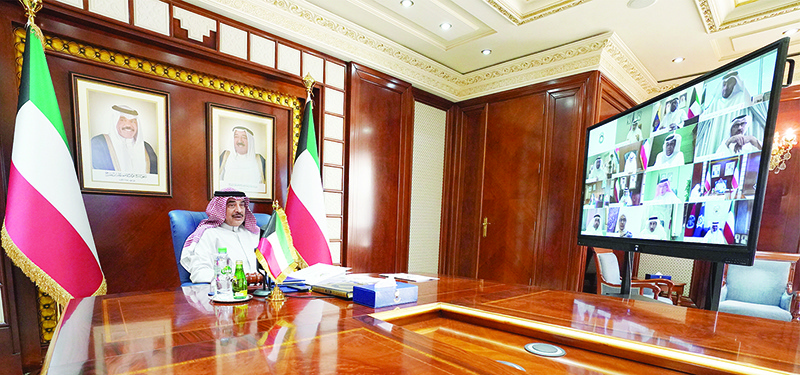
KUWAIT: The government plans today to announce more details about the gradual restoration of normal life in Kuwait. The government had announced during a meeting Monday that there were no plans to extend the full curfew, which is due to end Saturday. Instead, Kuwait will transition back to partial curfew to pave way for restoration of normal life, Deputy Premier and Interior Minister Anas Al-Saleh said. Saleh, also Minister of State for Cabinet Affairs, made those statements during an online press conference following a cabinet meeting to discuss how to restore normal life in the coming days. The meeting was held via video conference and chaired by His Highness the Prime Minister Sheikh Sabah Al-Khaled Al-Hamad Al-Sabah.
The government was expecting improvement of the health situation due to compliance with the full curfew, which entered force on May 10. “I would like to thank everyone for their great commitment to the full curfew and hopefull this commitment will continue with the partial curfew,” said Saleh.
Situation improvement
Saleh said the Ministry of Health believed the full curfew contributed to improving the situation in the country. Saleh, meanwhile, said the government formed a committee with a mandate of honoring those working in the frontline in line with His Highness the Amir Sheikh Sabah Al-Ahmad Al-Jaber Al-Sabah’s instructions. Bader Al-Hamad, Undersecretary of the Civil Services Commission (CSC), spoke in the same news conference about rewarding the employees working between February 24 and May 31 financially. He said the committee classified employees working during the pandemic crisis into three segments. The first were employees of the Ministry of Interior and Ministry of Health who were directly dealing with infected people and suspected infectees, said Hamad.
The second, he added, were people working in government departments who were dealing with suspected cases, working in border crossings, quarantine facilities and clinics. The third category, said Al-Hamad, were employees working in supporting lines who were assigned to work during the partial or full curfew. Those employees, continued Hamad, would be honored in accordance with the degree of risk they were exposed to: high and medium. He said the government would consider people dying from the virus as martyrs, and infectees would be given a special allowance until their recovery.
Treatment mechanism
The Ministry of Health also adopted a fresh mechanism for dealing with medical staff infected with the novel coronavirus (COVID-19). If someone from medical teams unluckily contracts the virus, he or she will be home-quarantined and then be tested on the fifth day of infection, the ministry’s Undersecretary Dr Mustafa Redha said in a separate statement Monday. In case of negative tests, he or she will be allowed to get back to work, provided that personal protection kits be used, he stressed. Confirmed positive cases will be placed under home quarantine and be then tested on the 12th or 13th day and in case of negative tests, then they will be able to return to work on the 14th day, he elaborated.
Workers’ accommodation
In the meantime, the government adopted a set of decisions dealing with quarantine facilities and improving accommodation of workers amidst spread of coronavirus. The cabinet assigned the Public Authority of Sport to hand over the halls in Tadhamon Sport Club to the quarantine team to be transformed into a field emergency unit to support Farwaniya Hospital, government spokesman Tareq Al-Mezrem told the online press conference. The cabinet, he added, obliged all companies to provide housing units for their workers who were infected with coronavirus. Those units, he said, should be equipped with all necessary needs in line with Ministry of Health’s instructions. The government, said Mezrem, assigned Ministry of Finance to lease hotels to be used as quarantine facilities. The government also assigned the Public Authority for Agricultural Affairs and Fish Resources to coordinate with Kuwait Flour Mills Company to provide fodder to livestock owners. The authority should also coordinate with Public Authority for Industry and the Environment Public Authority (EPA) to study possible establishment of light-industry factories within the farm land, used as recycling wasted fodder. — KUNA

